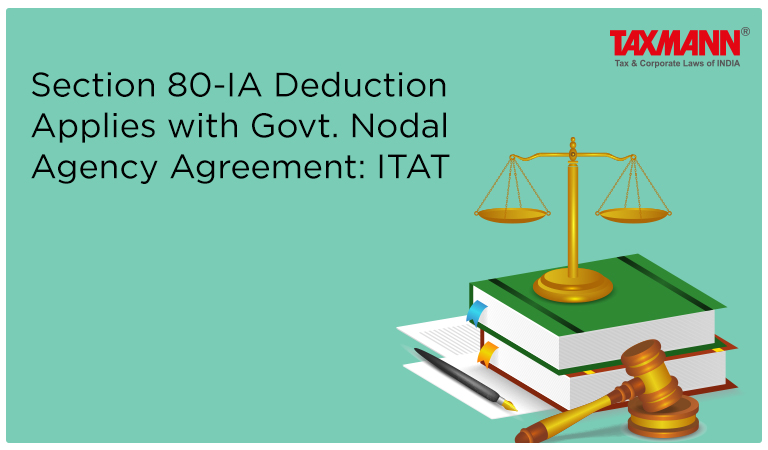Section 80-IA Deduction Applies with Govt. Nodal Agency Agreement: ITAT
- Blog|News|Income Tax|
- 2 Min Read
- By Taxmann
- |
- Last Updated on 11 May, 2023

Case Details: Bothra Shipping Services Pvt. Ltd. v. DCIT - [2023] 150 taxmann.com 200 (Kolkata - Trib.)
Judiciary and Counsel Details
-
- Rajpal Yadav, Vice-President and Girish Agarwal, Accountant Member.
- Naresh Jain, Adv. for the Appellant.
- G. Hukuga Sema, CIT, D/R for the Respondent.
Facts of the Case
Assessee entered into an agreement with an entity (KSPL) for the development of a Mechanised Coal Handling System in Kakinada Deep Water Port. KSPL was appointed as Nodal Agency by the Government of Andhra Pradesh (GoAP) for the development and maintenance of the infrastructure facilities of the entire Port.
The Government of Andhra Pradesh entered into a separate agreement with KSPL for the development of new infrastructure facility at the Port. Subsequently, the assessee derived permission from the appropriate authorities, developed the infrastructure as required and obtained certificate from the Port Authorities that it forms part of the infrastructural facility of the Port.
Since the assessee developed, maintained and operated the new infrastructure facility, it claimed deduction under section 80-IA(4). Assessing Officer (AO) denied the deduction because the agreement for such development was not directly with the Central Government, a State Government, a local authority, or any other statutory body.
The Dispute Resolution Panel (DRP) also upheld the findings of the AO, and the matter then reached the Kolkata Tribunal.
ITAT Held
The Tribunal held that the agreement provides for subrogation of rights and obligations to a body corporate with the consent of GoAP and also with its prior approval on the shareholding pattern. Pursuant to such a provision in the agreement, a ‘Special Project Company’ (SPC) in the form of KSPL was set up. The GoAP recognizes this SPC (KSPL) for all legal and operational purposes and shall be a successor for the rights, duties, and obligations under the agreement.
Further, the Tribunal relied upon the CBDT Circular No. 10/2005 dated 16-12-2005, whereby it had relaxed the second condition prescribed u/s 80-IA(4) and, therefore, the only requirement which remained was to obtain the certificate from the concerned Authority that the infrastructural facility forms part of the Port.
The Tribunal also considered a letter issued by KSPL which confirms that on expiry of the concession period, the structures, buildings constructed by or belonging to KSPL or their sub-contractors, sub-lessees and assignees free from all encumbrances and liabilities shall automatically become the property of GoAP without any obligation to reimburse therefor.
Moreover, the argument canvassed by the AO that the agreement between the assessee and KSPL does not satisfy the condition prescribed in section 80-IA(4) is too rigid an interpretation. It frustrates both the purpose of creating such nodal agencies and the legislative intent of granting deduction to the assessee engaged in infrastructure development projects.
Therefore, after considering all the aspects, the deduction under section 80-IA(4) cannot be denied to the assessee.
Disclaimer: The content/information published on the website is only for general information of the user and shall not be construed as legal advice. While the Taxmann has exercised reasonable efforts to ensure the veracity of information/content published, Taxmann shall be under no liability in any manner whatsoever for incorrect information, if any.

Taxmann Publications has a dedicated in-house Research & Editorial Team. This team consists of a team of Chartered Accountants, Company Secretaries, and Lawyers. This team works under the guidance and supervision of editor-in-chief Mr Rakesh Bhargava.
The Research and Editorial Team is responsible for developing reliable and accurate content for the readers. The team follows the six-sigma approach to achieve the benchmark of zero error in its publications and research platforms. The team ensures that the following publication guidelines are thoroughly followed while developing the content:
- The statutory material is obtained only from the authorized and reliable sources
- All the latest developments in the judicial and legislative fields are covered
- Prepare the analytical write-ups on current, controversial, and important issues to help the readers to understand the concept and its implications
- Every content published by Taxmann is complete, accurate and lucid
- All evidence-based statements are supported with proper reference to Section, Circular No., Notification No. or citations
- The golden rules of grammar, style and consistency are thoroughly followed
- Font and size that’s easy to read and remain consistent across all imprint and digital publications are applied



 CA | CS | CMA
CA | CS | CMA
